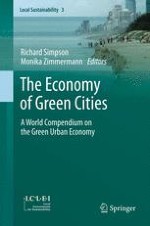2013 | OriginalPaper | Chapter
Green Clusters and the Entrepreneurial Local Government: Portland’s Economic Development Strategy
Authors : Shay Kelleher, Art von Lehe
Published in: The Economy of Green Cities
Publisher: Springer Netherlands
Activate our intelligent search to find suitable subject content or patents.
Select sections of text to find matching patents with Artificial Intelligence. powered by
Select sections of text to find additional relevant content using AI-assisted search. powered by
